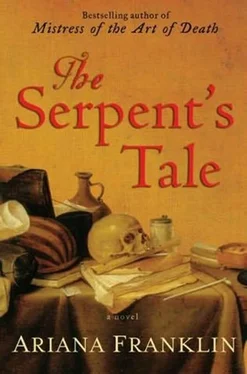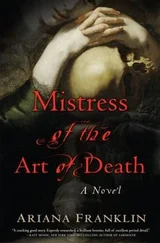Of the two culprits, Lord Wolvercote should have come out of the meeting better; Schwyz, after all, was being paid for his services, whereas Wolvercote was rendering his for free. But the Abbot of Eynsham was also present, and, as well as being a friend to Schwyz, he had the cleverer and more persuasive tongue.
It was noted by those who saw Lord Wolvercote emerge from the queen’s presence that he was snarling. “A’cause he don’t get young Emma, neither,” Gyltha reported. “Not yet, at any rate.”
“Are you sure?”
“Certain sure,” Gyltha said. “The girl’s been pleading with Mother Edyve, and she’s asked for Eleanor’s protection. The which the queen says old Wolfie ought to wait.”
Again, this had come from the convent kitchen, where Gyltha’s friend Polly had helped the royal servants carry refreshment to the meeting between the queen and the mercenary leaders. Polly had learned many things, one of them being that the queen had complied with Mother Edyve’s request for Emma’s marriage to Wolvercote to be delayed indefinitely, “until the young woman has recovered from the affliction to her spirits that now attends them.”
Polly reported that “his Wolfie lordship weren’t best pleased.”
Adelia, relieved, didn’t think the Bloats would be, either. But by now, everybody knew what the affliction was that attended Emma’s spirits and, according to Gyltha, there was general sympathy for her, much of which sprang from the equally general dislike for Wolvercote.
There was more good news from the kitchen. With order restored, Eleanor had, apparently, announced that the church was to be reopened, services resumed, and, when it came, Christ’s Mass to be celebrated with a feast.
“Proper old English one, too,” Gyltha said, a pagan gleam in her eye. “Caroling, feastin’, mummers, Yule log, and all the trimmin’s. They’re killin’ the geese and hangin’ them this very minute.”
It was typical of Eleanor, Adelia thought, that having saved the convent’s store of food and drink, she now imperiled it. Feasting the entire community would be an enormous and expensive undertaking. On the other hand, the queen’s orders had been necessary and perceptive; they might well defuse a situation that was becoming intolerable. And if a feast could introduce gaiety into Godstow, by God, it needed it.
With the resurgence of Eleanor’s energy came an invitation. “To Mistress Adelia, a summons from her gracious lady, Queen Eleanor.” Jacques brought it.
“You running errands for royalty now?” Gyltha asked at the door. The messenger had found brighter clothes from somewhere, curled hair hid his ears, and his perfume reached Adelia, who was across the room.
He’d also found a new dignity. “Mistress, I am so favored. And now I must go to the Lord Mansur. He, too, is summoned.”
Gyltha watched him go. “Aping they courtiers,” she said with disapproval. “Our Rowley’ll kick his arse for him when he comes back.”
“Rowley’s not coming back,” Adelia said.
When Mansur strode into the royal chamber, one of the courtiers muttered audibly, “And now we entertain heathens.” And as Adelia followed behind with Ward ambling at her heels, “Oh, Lord, look at that cap. And the dog , my dear.”
Eleanor, however, was all kindness. She came sweeping forward, offering her hand to be kissed. “My Lord Mansur, how pleased we are to see you.” To Adelia: “My dear child, we have been remiss. We have been kept busy with matters of state, of course, but even so I fear we have neglected one with whom I fought against the devil’s spawn.”
The long upper room had been the abbess’s, but now it was definitely Eleanor’s. For surely Mother Edyve had not scented it with the richness of the heathen East nor filled it with artifacts so colorful-shawls, cushions, a gloriously autumnal triptych-that they eliminated the naïve, biblical pastels on her walls. Mother Edyve had never knelt at a prie-dieu made from gold, nor would her bedposts have roared with carved lions, nor had gossamer, floating like cobwebs, descended from the bed’s tester over her pillow, nor male courtiers like adoring statuary, nor a beautiful minstrel to fill the abbatial air with a love song.
Yet, Adelia thought, still astonished by the bed-how had they got the thing on the boat?-the effect was not sexual. Sensual certainly, but this was not the room of a houri, it was merely…Eleanor.
It had certainly drawn Jacques into its spell. Lounging in a corner, he bowed to her, beaming and waggling his fingers. So here he was, and-to judge from the joy exuding from him, his even higher boots, and a new style of hair that hid his wide ears-in Aquitanian fashion paradise.
The queen was plying Mansur with dried dates and almond-paste sweetmeats. “We who have been to Outremer know better than to offer you wine, my lord, but”-a click of elegant royal fingers toward a page-“our cook magicks a tolerable sherbet.”
Mansur kept his face stolidly blank.
“Oh, dear,” Eleanor said. “Does the doctor not understand me?”
“I fear not, lady,” Adelia said. “I translate for him.” Mansur was fairly fluent in Norman French, which was being spoken here, but the pretense that he was restricted to Arabic had served the two of them well, and probably would again; it was surprising what he learned when among those who believed him not to understand. And if Bertha’s killer was somewhere among this company…
What could be wanted of him? He was being treated with honor for someone whose race the queen had gone on Crusade to defeat.
Ah, Eleanor was asking her to pass on praise to Mansur for his medical skill in saving the life of “one of dear Schwyz’s mercenaries”; Sister Jennet had sung so highly of him.
That was it, then. A good physician was always worth having. Christian disdain for Arab and Jew did not extend to their doctors, whose cures among their own people-partly brought about, Adelia believed, by their religions’ strict dietary laws-gave them a high reputation.
So she herself was here merely as an interpreter.
But no, apparently she was a witness to Eleanor’s courage; history was being changed.
Propelling her around by a hand on her shoulder, the queen told the story of what had happened in the upper room of Wormhold Tower, where, in the presence of a rotting corpse, a sword-wielding demon had appeared.
Eleanor, it seemed, had held up a calm hand to it. “Thou art a Plantagenet fiend, for that race is descended from demons. In the name of Our Savior, go back to thy master.”
And lo, the fiend had dropped its sword and slunk back whence it had come.
What did I do? Adelia wondered.
“…and this little person here, my own Mistress Athalia, then picked up the sword the fiend had dropped, though it was still very hot and stank of sulphur, and threw it out of the casement.”
Glad I could help. Adelia speculated on whether the queen believed her own nonsense and decided she didn’t. Perhaps Dakers’s attack had shocked and embarrassed her so that she must now present it to her advantage. Or perhaps she was playing games. She was bored; all these people were bored.
Having ooh ed and aah ed throughout the recital, the courtiers applauded-except Montignard, who, with a dirty look at Adelia, burst out with, “But it was I who ministered to you afterwards, lady, did I not?” though the list of the things he had done was overlaid by a slow hand clap from the Abbot of Eynsham leaning against one of the bedposts.
Eleanor turned on him, sharp. “Our neglect is actually yours, my lord. We charged you to look after our brave Mistress Amelia, did we not?”
Читать дальше











